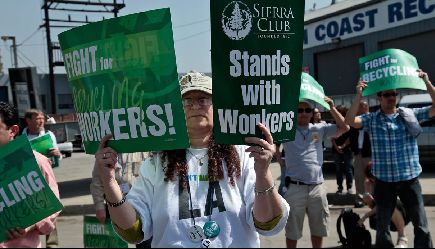It's Time To Expand Los Angeles' Recycling Efforts

Hillary Gordon whe heads the Angeles Chapter Zero Waste Committee protested at the rally.
photo by Tom Politeo
“Shame on them!” cried labor, environmental and community activists assembled in front of American Reclamation’s waste sorting center in the Atwater area of Los Angeles.
The rally for zero waste and responsible recycling happened at lunchtime March 15, the first day of the Good Jobs Green Jobs regional conference in L.A. sponsored by the Sierra Club.
The “shame” chant was a response to the testimony of Karla Campos, a waste sorter at the company who lost her job after a work-related injury, and of Duan Draper, a waste hauler, who described the lack of safety equipment provided to workers and the slipshod maintenance of the trucks.
What happens to the trash you sort carefully and deposit into the blue, green and black bins? If you live in a single-family house, the city empties each color bin into an appropriate truck. But what if you live in an apartment or condo, and what about offices and retail stores?
There is a completely different system of trash disposal for multifamily dwellings and businesses. These entities negotiate with independent waste haulers and usually don’t bother with the added expense of recycling collection. There are no regulations or standards at the city level governing waste hauling and sorting in the commercial and multifamily sectors.
Hillary Gordon, Chair of the Angeles Chapter’s Zero Waste Committee likens the waste disposal industry in Los Angeles to the Wild West. So does Greg Good of LAANE (Los Angeles Alliance for a New Economy). He points out that 30 percent of the 2.9 million tons of waste we send to landfills and incinerators is household waste, while 70 percent is from businesses and multifamily dwellings.
Mayor Antonio Villaraigosa proudly claims that 71 percent of Los Angeles’s trash is recycled, well above the 33 percent U.S. average. But that diversion is happening primarily from single-family households and a portion of the multi-family sector serviced by the Bureau of Sanitation. Think of how much closer we could get to achieving true zero waste in Los Angeles by increasing diversion from apartments, condos and businesses.
Recycling brings twice the number of jobs as landfills and incinerators do. But recycling facilities are usually situated in communities without enough resources or clout to say “no.” Those communities also get the trash dumps and incinerators. We must insist that recycling facilities be clean, safe and sited fairly.
But back to the rally. American Reclamation employs workers who are on the front lines in the effort to achieve L.A.’s goal of 95 percent diversion of waste from landfills and incinerators. These workers haul and sort commercial trash to salvage recyclable materials.
American Reclamation has public contracts with entities like the City of El Monte. At its facility, workers say wages are low and working conditions are unsafe. Work areas are filthy and have little ventilation. Campos described a lunchroom crawling with rats and restrooms crawling with other life forms. Neither the haulers nor the sorters are given any safety equipment such as gloves, glasses or goggles, masks. They must provide their own or go without. Workers get no benefits either.
“It’s about respect!” say the Teamsters. More than 32,000 drivers, helpers, throwers, mechanics and other workers in the solid waste, recycling and related industries belong to the International Brotherhood of Teamsters. The union would like all solid waste and recycling workers to be able to join them and stand together to negotiate fair wages, benefits and workplace safety issues. “With the protection of a union you can speak out against unsafe practices that endanger you or the public.”
Green jobs should be good jobs. Allison Chin, Sierra Club Treasurer and past President says, “We choose good jobs and a clean environment.” Teamsters General President, James P. Hoffa, agrees.
Get Involved Recycling
What to do to improve recycling in Los Angeles
- If you live in a condo or apartment and work in offices or retail space, ask questions and do a bit of investigating to see who picks up the trash and whether there are opportunities to sort recyclable materials.
- Watch what happens to trash deposited into recycling bins. Does it simply get mixed in with all the other trash, or is it removed separately? Talk to the management at your apartment or condo complex.
- Support labor unions in their attempts to organize workers.
- Support a bill, now working its way through committees at City Hall, that would create a franchise system for multi-family and commercial trash collection. This would give certain companies responsibilities for designated “waste sheds.” This would compel the private solid waste industry to have some accountability.
Volunteers interested in participating in this important campaign should contact Zero Waste Committee chair Hillary Gordon or Conservation Coordinators Jennifer Robinson (Jennifer.robinson@sierraclub.org) or George Watland (george.watland@sierraclub.org)



Add new comment